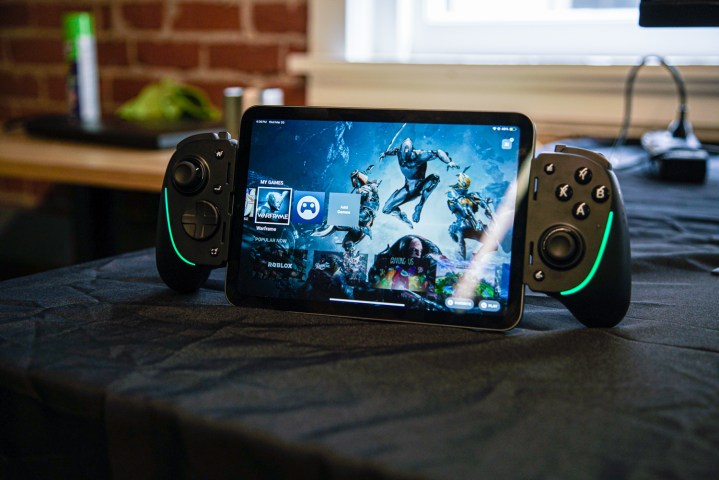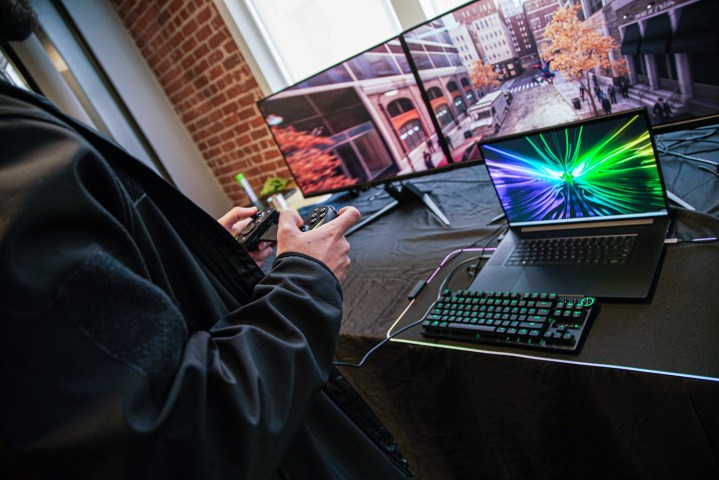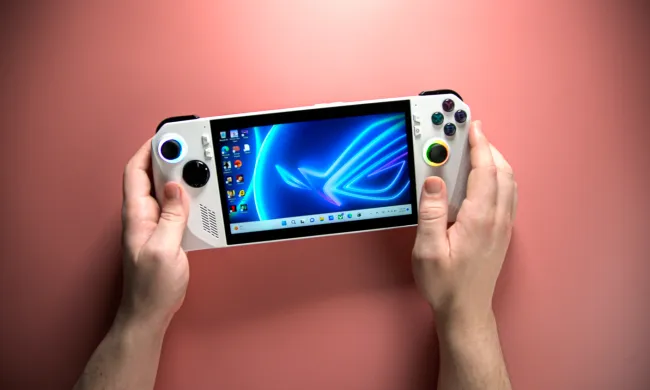
Razer has been oddly quiet in the burgeoning world of handheld gaming PCs. When I met up with the company at the Game Developers Conference (GDC) to learn about its new products, I was happy to hear it had an answer to the success of the Steam Deck.
But it was not the type of answer I was expecting.
It’s the Razer Kishi Ultra. Similar to the Kishi, it’s a telescopic controller — that’s a controller that wraps around your phone and turns a mobile screen into a handheld gaming device. It’s much larger than the original Kishi, with full-size sticks and buttons, and its big claim to fame is support for a tablet as large as the iPad mini.
The future of handheld gaming

By definition, it’s not a handheld gaming PC, but according to Razer product manager Joey Hanna, it fills a similar role. Hanna worked on the original Kishi and the Android-based Razer Edge, which is where the Steam Deck comparison comes into play. When meeting up with Hanna at GDC, the Kishi Ultra felt like an inflection point.
Hanna insisted that the Kishi Ultra actually had some unique advantages over the Steam Deck and devices like the ROG Ally. The ergonomics were a key point, with clicky face buttons that feel tactile and responsive, as well as curved grips that rest in your hand like an Xbox controller. The adjustable plastic back helps, too; it holds the two ends of the controller firmly in place, so you don’t get the awkward wobble you run into with the original Kishi.
In the demo, Razer showed me the Kishi Ultra set up with an iPad Mini — and I have to admit, even playing basic mobile games on an 8.3-inch Liquid Retina display was stunning. You’re not contending with fan noise, heat, and a couple of hours of battery life either, which are elements of a handheld gaming PC that I’ve become acutely familiar with.

The package is excellent here. Razer’s Mecha-Tactile face buttons and D-pad feel great, as do the Hall Effect analog triggers and Razer haptics. You have access to Razer Nexus, too, allowing you to rebind controls, manipulate the built-in RGB lighting, and map buttons to touch control for those games that don’t support a controller.
If you were to believe Razer, this is the future of mobile gaming. The devices are powerful enough to play games natively, and you have the cloud for anything more demanding. You also have access to a high-quality controller that can strap on one of the best mobile displays you can buy — the iPad Mini. It’s a convincing story, but after using the Kishi Ultra, I’m not sure I agree with it.
I’m skeptical

The Kishi Ultra is $150, which is a steep price no matter how you slice it considering this is, at its core, just a controller. Add on top of that the $500 you’ll spend on the cheapest iPad Mini, and you’re already spending more than what you’d spend on a Steam Deck OLED or ROG Ally. If this is the future of mobile gaming, it’s an expensive one. You can just use your phone or a cheaper Android tablet, but that really doesn’t make the Kishi Ultra shine.
There’s also the inherent flaw with this design that plagued the Razer Edge 5G. There are areas in the country where access to fast Wi-Fi and 5G is abundant, but far more where it’s not. Are you not going to use a $650 handheld gaming setup on a plane? Or a road trip? The problem with adopting the Kishi Ultra as your main handheld is the same problem with cloud gaming in general — even in 2024, it’s inconsistent.
The regular Kishi has its place as a companion device, but Hanna tells me the Kishi Ultra is going after a different crowd — core gamers who want a complete mobile gaming experience on the go. The quality is there when it comes to the controller itself, but the practically of using this setup in place of a Steam Deck or ROG Ally falls flat.
Not your replacement

I left my short demo with the Razer Kishi Ultra impressed, but not converted. It’s a high-quality controller and a clear step up from the regular Kishi, but it fills the same role that the Kishi does. This isn’t a replacement for your Steam Deck or ROG Ally.
Razer has been focused on the mobile gaming crowd for a few years now with devices like the Edge 5G and now the Kishi Ultra, but I’d be curious to see what a true handheld gaming PC from Razer would look like. After all, Razer already makes some of the best gaming laptops, and with disappointing releases like the MSI Claw, a bit more competition among PC handhelds wouldn’t be a bad thing.




